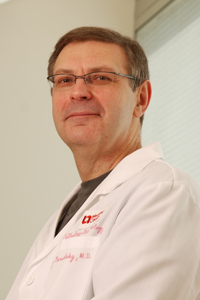 |
Yuri Persidsky, M.D., Ph.D. |
NOTE: This profile is part of a series highlighting the 26 researchers who were named UNMC Distinguished Scientists or New Investigators for 2007. Each of these researchers will be profiled in UNMC Today leading up to a March 20 ceremony to recognize their achievements.
- Name: Yuri Persidsky, M.D., Ph.D.
- Title: Professor
- Joined UNMC: 1994
- Hometown: Kiev, Ukraine
Briefly describe your research in laymen terms, please.
We study how the interface between blood and brain, known as the blood brain barrier (BBB), functions under normal conditions and during diseases. Composed of highly specialized brain endothelial cells, the BBB regulates supply of nutrients to neural cells, protects them from toxic compounds and inflammatory cells circulating in blood. The BBB dysfunction present in all neurological disorders can affect disease progression and in some instances, is their cause.
What led you to pursue this area of research?
Evidences that the BBB function is impaired in diverse neurological disorders (including Alzheimer’s and Parkinson’s diseases, multiple sclerosis, and HIV-1 encephalitis) and significant, yet largely unexplored potential to treat them exists via normalization of BBB or new methods for drug delivery across BBB.
How do you see your research contributing to science?
We work on understanding the endothelial functions that are critical and applicable for any disease such as atherosclerosis, stroke, tumor metastases and inflammatory disorders of any organ, just to name a few.
Why did you become a scientist?
First it was a natural curiosity and eventually a realization that this is a unique opportunity to find and characterize things never described before.
What is your hope for the next generation of scientists?
That they are able to work on true cross disciplinary projects and in a fair system of funding allowing to spend less time on grant submissions and more time on actual research.
Beyond grant funding, how do you measure success?
First, new revolutionary ideas and observations that are proven to be correct through elegant and decisive experiments and then translated into treatment. Second, by the success of the students and faculty you have mentored. I never consider funding per se a true measure of success.
What would you tell a student interested in a research career?
A research career is a lifestyle requiring an enormous time commitment, yet it is very rewarding. Pick a topic that will be relevant for diverse diseases and pathologic conditions, make sure that you have appropriate collaborators, maintain focus and always be open minded.
Do you have a hero/role model? If so, what do you admire most about them?
My parents (both university professors) who never told me what to do, rather they taught me by example of how to approach tough problems in life and science.
Tell us about your family and hobbies outside of the lab.
Raisa, my wife, is a researcher in neuroimmunology and glial cell biology at UNMC. We met in medical school and have been married for almost 30 years. We have one daughter, Anastasia, a first-year medical student, and our dog Jesse that has traveled with us from Kiev, Ukraine to Strasbourg, France and Omaha. My wife and I enjoy traveling together (here in the United States and overseas), fine art, jazz and an ever expanding list of red wines.
List three things few people know about you.
- I am the fifth generation of medical doctors in my family.
- I was taught music (piano) and even attended my first two grades in special school, but failed.
- I learned English by listening to BBC news on radio and reading James Bond novels (neither well-tolerated in the USSR).